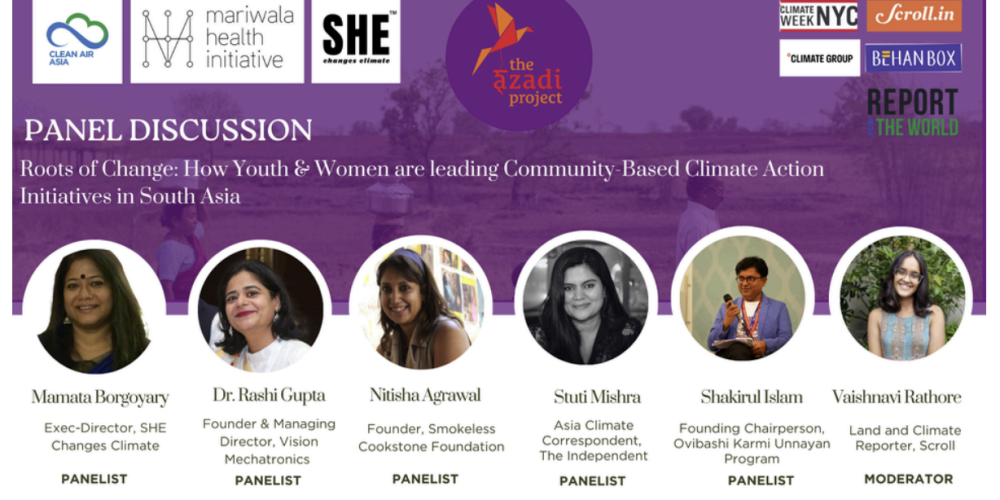On September 14, 2024, The Azadi Project SHE Changes Climate roundtable, emerged as a pivotal platform to address the urgent need for inclusive climate action, especially for marginalized communities such as women, queer people, indigenous populations, and migrants. With the goal of developing a comprehensive and inclusive climate action plan, this event ensures that the voices and needs of these communities are integrated into climate strategies at local government levels.
Shakirul Islam, Chair of OKUP, emphasized the need for a rights-based approach, stating,
“Effective climate action must address the root causes of migration, while ensuring the rights of vulnerable communities. Our focus is not just on short-term solutions, but on creating pathways that empower people to build sustainable futures, whether they choose to stay or migrate.”
Panel Discussions: Roots of Change
Shakirul Islam contributed to Panel 3: Roots of Change: How Youth & Women are Leading Community-Based Climate Action Initiatives in South Asia, which featured a diverse range of voices, including those from affected communities, policymakers, climate experts, youth activists, and civil society organizations. The panel discussed the leadership roles of women and youth in grassroots climate action.
OKUP’s engagement in the roundtable highlighted the critical need for equipping youth and women with transformative skills that can help them thrive in both local and global job markets. These skills not only increase their employability but also strengthen their resilience to climate change, enabling them to adapt and lead in their communities. Shakirul shared,
“By focusing on transformative skills for youth and women, we’re ensuring that they can compete in the global job market, while also creating local opportunities that reduce the need for forced migration.” This approach is vital for building both individual and community resilience in the face of climate challenges.
Crafting Rights-Based, Community-Led Solutions
At the core of OKUP’s work is a rights-based approach to climate-induced migration. The roundtable allowed OKUP to present its ongoing research and action projects that explore the links between climate change and migration, focusing on crafting community-led solutions that are both sustainable and inclusive.
OKUP’s longitudinal research sheds light on how climate change is pushing people, especially in vulnerable regions, to migrate. Shakirul emphasized the need for legal pathways for migrants, adding, “We must ensure that migrants have access to legal frameworks that protect their rights, whether they choose to move in search of better opportunities or stay in their communities.”
The Right to Stay, The Right to Move
A central theme of OKUP’s participation was the dual principle of the right to stay and the right to move. OKUP’s work highlights the importance of offering people the choice: to remain in their homes with sustainable livelihoods or to migrate with dignity and proper legal support.
Shakirul explained,
“Climate change forces many people into migration, but the right to stay must be safeguarded as well. By providing opportunities for employment and skill development locally, we can reduce the pressure to migrate. At the same time, those who do choose to move must have access to safe, legal pathways.”
Evidence-Based Advocacy for Policy Change
OKUP’s involvement in the roundtable was deeply rooted in its evidence-based advocacy. The organization’s research findings on the impacts of climate change and migration will inform policy discussions on a rights-based approach to climate-induced migration. OKUP is advocating for policies that emphasize both the right to stay and the right to move, while addressing loss and damage, and building resilience.
Shakirul remarked, “Our research shows that without legal protections and pathways, migrants often fall into vulnerable situations, whether they stay in their home countries or move abroad. It’s crucial that policies address these gaps to protect migrants and promote sustainable, resilient communities.”
Moving Forward: A Roadmap for Inclusive Climate Action
The action plan developed during the roundtable will be a key document in guiding local governments as they implement climate solutions tailored to the needs of marginalized communities. The submission of this plan marks an important step toward ensuring that women, indigenous populations, migrants, and other vulnerable groups are not left behind in the global fight against climate change.
Stay tuned for further updates on OKUP’s continued engagement in these critical discussions and their efforts to drive meaningful change.


